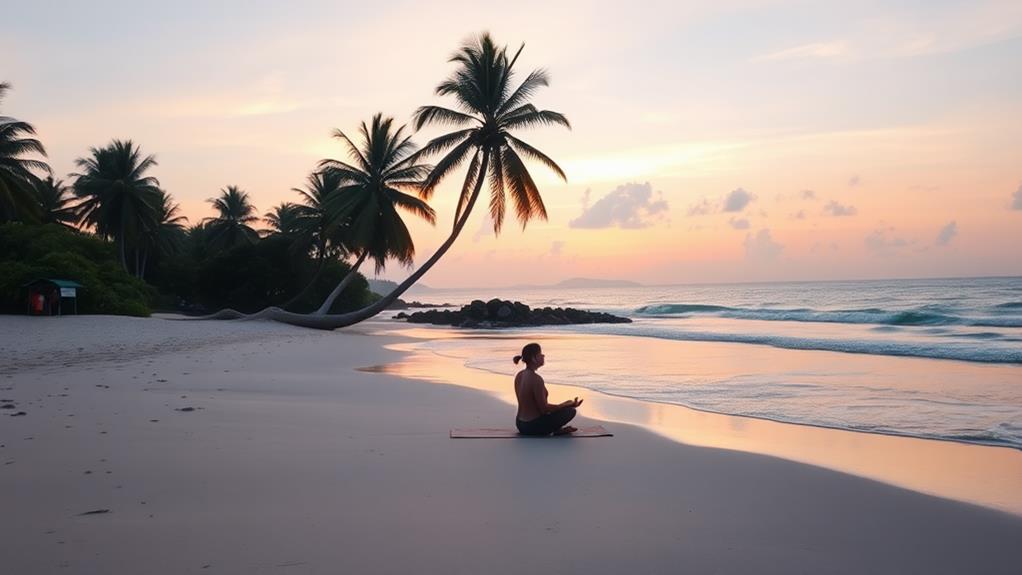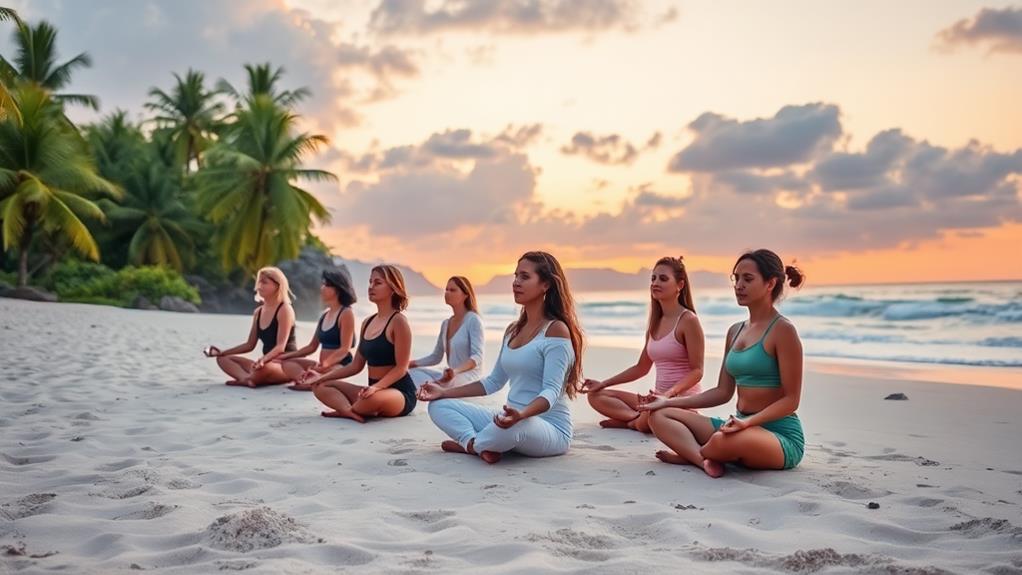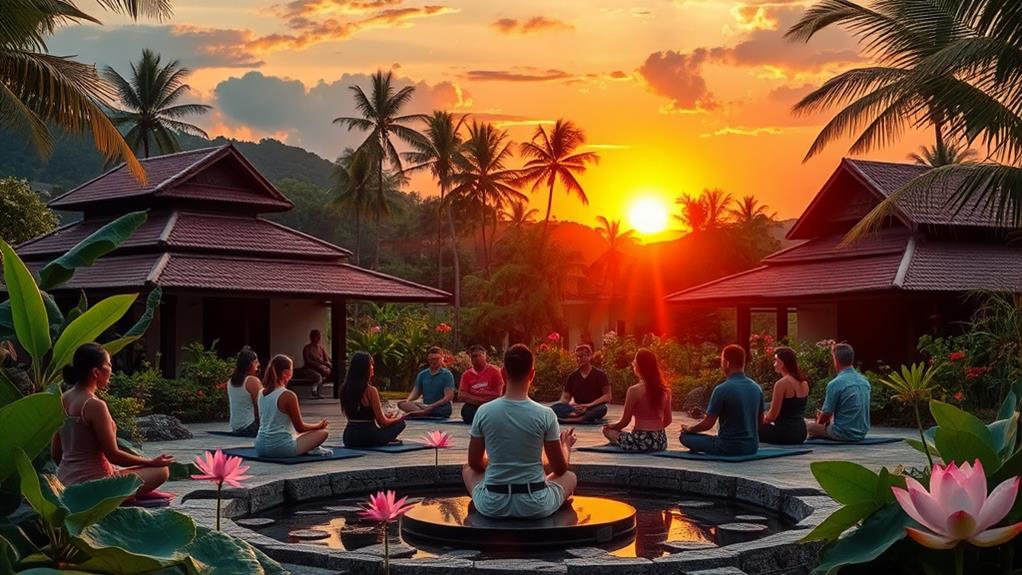Meditation and Mindfulness Practices in the Philippines
In the Philippines, meditation and mindfulness practices are a vibrant mix of personal growth and community connections. Wellness retreats offer unique experiences, such as Couples Tantra and Mind-Body Harmony, which combine yoga, meditation, and forest bathing. For instance, these retreats provide a chance to explore yoga and meditation in a serene environment, while forest bathing allows individuals to reconnect with nature.
Traditional healing practices, like Hilot, enhance these modern practices. Hilot is a traditional Filipino healing method that uses touch and herbal remedies to promote relaxation and well-being.
Organizations like the Philippine Insight Meditation Community provide resources for Vipassana meditation, helping individuals cultivate emotional resilience. This community offers guidance and support for those looking to develop their meditation practice and improve their emotional well-being.
By engaging in these practices, individuals not only nurture their well-being but also connect with the rich Filipino culture. These practices allow individuals to develop a deeper understanding of themselves and their connection to the world around them, while also appreciating the cultural heritage of the Philippines.
Wellness Tourism in the Philippines

Wellness Tourism in the Philippines: A Blend of Tradition and Holistic Health
In recent years, the Philippines has emerged as a prime destination for wellness tourism, offering unique experiences that combine traditional Filipino practices with holistic health approaches.
Wellness retreats cater to different needs, such as the 4-day Couples Tantra Retreat in El Nido or the 6-day Mind-Body Harmony Qigong Retreat in Bohol. These retreats focus on relaxation and mindfulness practices to enhance overall well-being.
Activities Promote Connection with Self and Nature
The wellness offerings include activities like yoga, meditation, and forest bathing, designed to promote a deeper connection with oneself and nature.
Accredited WellHotels in the Philippines ensure expert care and quality services throughout your stay, creating an immersive wellness experience.
Eco-Friendly Initiatives Benefit the Planet
Many retreats incorporate eco-friendly initiatives, such as tree planting donations, making your journey toward wellness also beneficial for the planet.
Traditional Healing Practices
Traditional Healing Practices in the Philippines
Traditional healing practices in the Philippines offer a holistic approach to wellness.
Hilot, a traditional Filipino healing practice, emphasizes the therapeutic benefits of touch. Practitioners, known as manghihilot, skillfully utilize massage, herbal remedies, and energy healing to restore balance and harmony within the body, mind, and spirit.
Indigenous Healing Rituals
In addition to hilot, the Philippines has various indigenous healing rituals that enhance the wellness experience:
Sound Healing: This practice engages with sound frequencies to promote relaxation and healing.
Herbal Medicine: Local plants are utilized for their medicinal properties to support health.
Energy Flow Techniques: These techniques involve understanding and facilitating the flow of energy (lambat) through specific pathways (sen).
Growing Appreciation for Traditional Healing
As wellness tourism grows in the Philippines, there's an increasing appreciation for these traditional healing practices.
This enriches one's journey with authentic wellness experiences that complement mindfulness meditation and other holistic approaches.
Mindfulness and Meditation

Mindfulness and Meditation in the Philippines
Introducing Mindfulness and Meditation
Mindfulness and meditation are valuable tools for enhancing mental and emotional well-being in the Philippines. These practices, rooted in ancient Buddhist traditions, emphasize present moment awareness and non-judgmental observation.
Vipassana Meditation
The Philippine Insight Meditation Community provides resources, workshops, and retreats that introduce Vipassana meditation, where clear awareness of current experiences is key. This practice helps individuals develop a deeper understanding of themselves and their emotions.
Mindfulness in Education and Therapy
Mindfulness training has been incorporated into educational and therapeutic settings in the Philippines, showing positive impacts on overall wellness.
Accessible courses cater to various skill levels, equipping individuals with practical tools for stress reduction and emotional resilience.
Culturally Contextualized Mindfulness Interventions
A local adaptation of mindfulness-based cognitive therapy (MBCT), called Kamalayan, was tested in the Philippines.
However, it revealed no significant changes in depression or anxiety, highlighting the importance of culturally contextualized mindfulness interventions. This emphasizes the need for mindfulness practices to be tailored to the local culture and context.
Unique Wellness Retreats
Wellness retreats in the Philippines offer a unique opportunity to rejuvenate your mind, body, and spirit. These retreats focus on mindfulness and personal growth, providing you with tailored experiences that promote relaxation and well-being.
Diverse retreat options cater to different needs and preferences. For instance, the 4 Day All-Inc Couples Tantra, Yoga & Intimacy Retreat in El Nido emphasizes intimacy and connection, allowing couples to deepen their relationship.
Alternatively, the 6 Day Mind-Body Harmony with Qigong in Bohol engages participants in traditional practices that enhance both physical and mental well-being. The 5 Day Self Love Yoga Retreat in Siargao focuses on personal growth, promoting self-acceptance through yoga and mindfulness.
Eco-friendly initiatives are an integral part of these retreats. A portion of the proceeds is donated to tree planting efforts, ensuring that the commitment to sustainability not only enhances your experience but also nurtures the environment.
These unique wellness retreats provide a nurturing space to unwind, connect, and grow. Whether you choose surfing, yoga, or Qigong, you can recharge and cultivate a deeper sense of self while surrounded by breathtaking scenery.
Pricing and Policies

Pricing and policies for retreats in the Philippines vary significantly, making it crucial to choose one that fits your budget and needs.
Retreat prices range from $599 to $2,890. For instance, the 6 Day Mind-Body Harmony with Qigong retreat is available for $599, while the 7 Day Surf, Yoga & Wellness Retreat costs $2,890.
Cancellation policies also differ. The 4 Day Couples Tantra, Yoga & Intimacy Retreat offers a 60-day free cancellation policy, whereas the 6 Day Mind-Body Harmony with Qigong retreat only allows a 1-day cancellation.
Other options include the 5 Day Self Love Yoga Retreat with a 72-hour cancellation policy, and the 5 Day Ceremony To Connect To Your Primal Powers with a 30-day cancellation policy.
Eco-Friendly Practices
Mindfulness Retreats in the Philippines Emphasize Eco-Friendly Practices
During your mindfulness retreat in the Philippines, you'll experience a strong commitment to eco-friendly practices that enhance both your experience and the environment.
These retreats prioritize sustainability, allowing you to deepen your connection with nature while promoting ecological awareness.
Supporting Environmental Restoration
Many retreats donate a percentage of their proceeds to tree planting initiatives, which directly contribute to environmental restoration.
Participants are encouraged to engage in sustainable practices during their stay, fostering a sense of responsibility for the planet.
Eco-Friendly Practices
Retreats incorporate various practices to promote sustainability:
Forest Bathing (Shinrin-yoku): This mindfulness practice immerses you in the natural environment, promoting relaxation and appreciation for the beauty around you.
Sustainable Travel Choices: Retreats encourage you to consider your ecological footprint, making mindful travel decisions that benefit the environment.
Awareness Campaigns: Many retreats raise awareness of environmental issues through workshops, helping you understand the impact of your actions.
Participant Experiences

Participants in mindfulness retreats in the Philippines experience transformative growth. These retreats foster a strong sense of community and personal growth, leading to high satisfaction rates. For example, the Couples Retreat and Self Love Yoga Retreat have achieved perfect scores.
The integration of mindful eating practices and traditional Filipino wellness elements enhances mental clarity and self-awareness. The supportive atmosphere created by organizers encourages emotional resilience and personal development. This is achieved by combining mindful eating with traditional Filipino wellness practices, leading to a deeper and more meaningful journey.
Participants commonly experience the following benefits:
Community Support: A family-like atmosphere that nurtures connections, allowing participants to form lasting bonds with like-minded individuals.
Personal Growth: Tailored experiences that promote self-discovery, enabling participants to gain a deeper understanding of themselves and their goals.
Mindful Eating: Opportunities to engage in healthy, intentional meals, teaching participants the importance of mindful eating practices for overall well-being.
Cultural Insights: Enrichment through local traditions and practices, providing participants with a unique perspective on Filipino culture and its contribution to wellness.
How Do Meditation and Mindfulness Practices Align with Feng Shui Principles in Filipino Culture?
In Filipino culture, the influence of feng shui is often reflected in the way meditation and mindfulness practices are incorporated into daily life. Both meditation and feng shui emphasize the importance of creating harmony and balance in one’s surroundings and inner self, making them complementary practices in achieving overall well-being.
Vipassana Meditation Insights
Vipassana Meditation: Cultivating Mindfulness and Understanding
Vipassana meditation, rooted in Buddhist teachings, emphasizes cultivating clear awareness of present moment experiences. This ancient practice guides individuals toward understanding suffering and its cessation through the Noble Eightfold Path, promoting ethical living and mental discipline.
Benefits of Vipassana Meditation
Engaging in Vipassana meditation can have profound effects on mental and emotional well-being.
It enhances emotional resilience through mindful awareness, allowing individuals to better navigate life's challenges.
It also increases understanding of thought patterns and behaviors, enabling individuals to make positive changes.
Additionally, Vipassana provides tools to manage stress effectively, promoting overall mental clarity.
Supporting Your Vipassana Journey
In the Philippines, the Philippine Insight Meditation Community offers workshops and retreats to support individuals in their Vipassana journey.
These resources help deepen your practice, leading to a more fulfilling and balanced life.
Future of Mindfulness in the Philippines

The future of mindfulness in the Philippines is promising. In recent years, there's been a surge in mindfulness-based interventions, such as the Kamalayan program, designed to meet local mental health needs. These culturally adapted strategies not only enhance health and well-being but also create a supportive community around mindfulness.
The Philippine Insight Meditation Community has played a key role in promoting mindfulness practices. They've fostered an environment where individuals can explore mindfulness safely through practices such as Vipassana.
Research has consistently shown that mindfulness practices, including Mindfulness-Based Cognitive Therapy (MBCT), are effective in improving mental health.
Access to mindfulness practices has become increasingly convenient. With the rise of online and in-person mindfulness courses and workshops, engaging in these practices has never been easier.
Future initiatives will focus on community engagement and cultural sensitivity, ensuring that mindfulness remains authentic while addressing modern psychological challenges.
Embracing mindfulness can have a transformative impact on individuals and the community. By empowering individuals and strengthening the collective mental health of the Filipino community, mindfulness can foster resilience and deeper connections with oneself and others.
Questions and Answers
Is Meditation a Common Practice in the Philippines?
Meditation is gaining popularity in the Philippines as a means to reduce stress and improve mental well-being.
In the Philippines, meditation is being practiced by individuals seeking relaxation and mental clarity. Mindfulness techniques, such as focusing on breath or body sensations, are commonly used to calm the mind and reduce anxiety.
As people explore different relaxation methods, they often find approaches that resonate with them. For instance, some individuals practice meditation through yoga or tai chi, which combine physical movements with mindfulness techniques.
What Are the Traditional Health Care Practices in the Philippines?
Traditional health care practices in the Philippines prioritize ancestral wellness through diverse healing methods.
One such technique is Hilot, which combines massage and herbal remedies to restore balance in the body. This practice is rooted in the country's rich cultural heritage.
Herbal remedies derived from indigenous plants are also commonly used to treat ailments, reflecting the deep connection Filipinos have with nature. For example, Lagundi leaves are used to treat coughs and colds, while Tsaang Gubat is used to treat fever and diarrhea.
Rituals and sound healing are also used to enhance well-being, providing a holistic approach that nurtures both the body and spirit. This approach acknowledges the interconnectedness of physical and mental health.
What Are Some Cultural Practices in the Philippines?
The Philippines has a rich cultural heritage shaped by indigenous beliefs and traditions.
Filipino cultural practices often revolve around spiritual festivals, where you can witness vibrant dances, colorful costumes, and heartfelt prayers. These festivals honor ancestors and nature, fostering community bonds and celebrating local heritage.
For instance, the Pintados Festival in Tacloban City, Leyte, features participants covered in colorful body paint, reenacting ancient tattooed warriors. Similarly, the MassKara Festival in Bacolod City, Negros Occidental, showcases smiling masks and lively street dances, symbolizing hope and resilience.
Immersing yourself in these cultural experiences helps you appreciate the Philippines' diverse culture and its people's deep connections with their history and spirituality.
What Are the Religious Practices in the Philippines?
The Philippines is a culturally diverse country with a rich tapestry of religious practices.
The majority of the population, approximately 86%, practices Roman Catholicism, which was introduced by Spanish colonizers in the 16th century. Many Filipinos actively participate in spiritual rituals, such as attending Sunday Mass, praying the rosary, and observing holy days like All Saints' Day and Christmas.
In addition to Catholicism, indigenous beliefs also play a significant role in the country's religious landscape. These beliefs honor ancestors and nature, and are often practiced by indigenous communities. For example, the Ifugao people of Cordillera region believe in a supreme god named Bathala, who's the creator of the universe.
Community gatherings and festivals are an integral part of religious practices in the Philippines. During these events, devotion comes alive through parades, dances, and music.
The Sinulog Festival in Cebu, for instance, is a vibrant celebration that honors the Santo Niño, or the Child Jesus. Similarly, the MassKara Festival in Bacolod is a colorful event that showcases the city's rich cultural heritage.